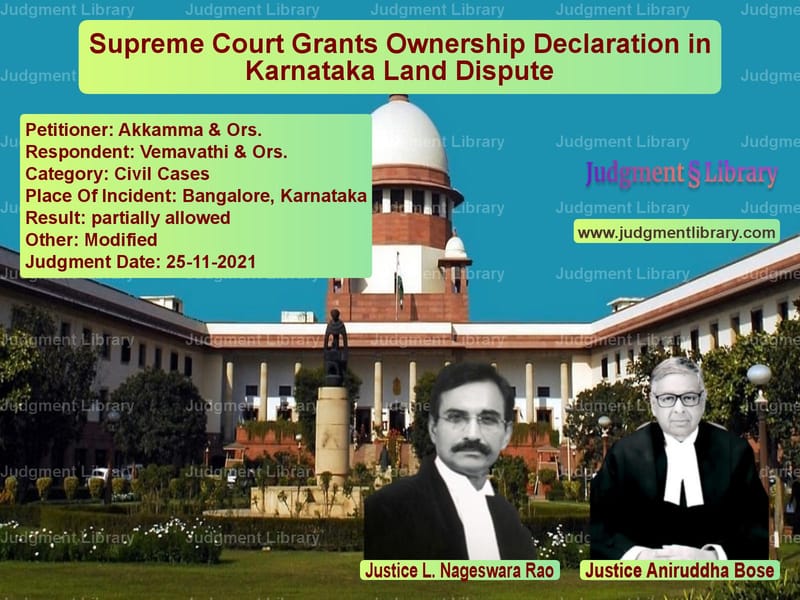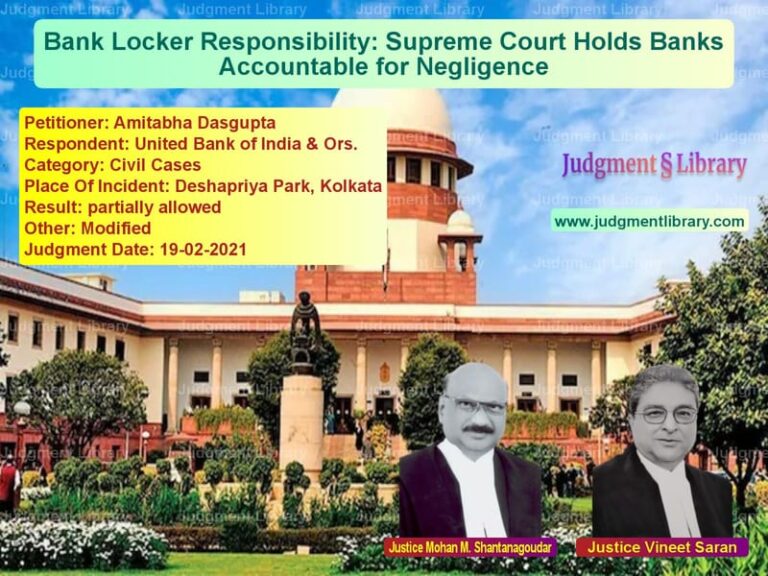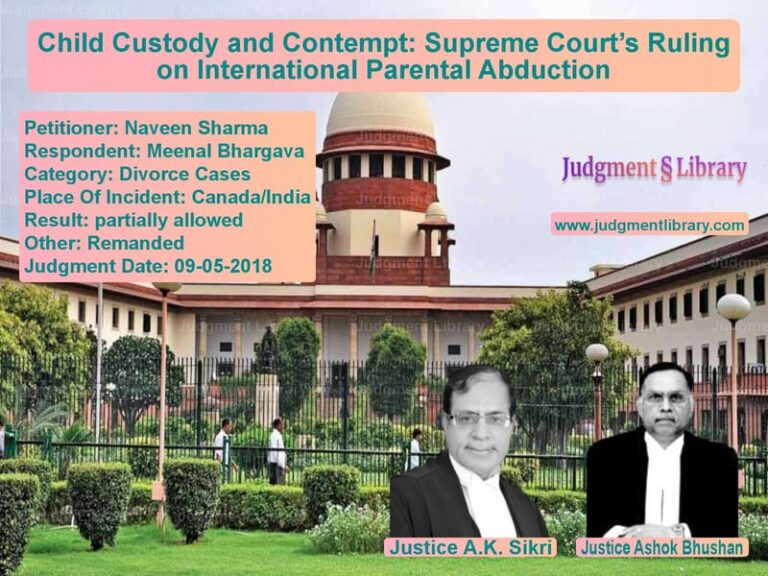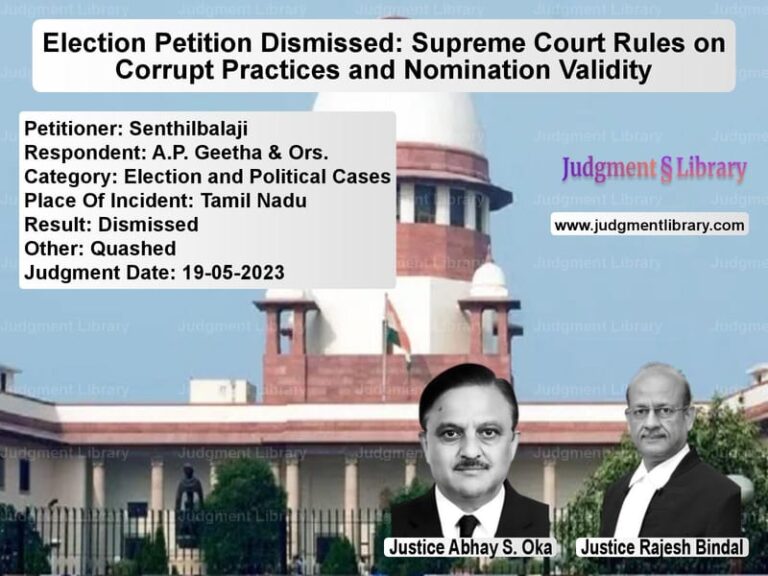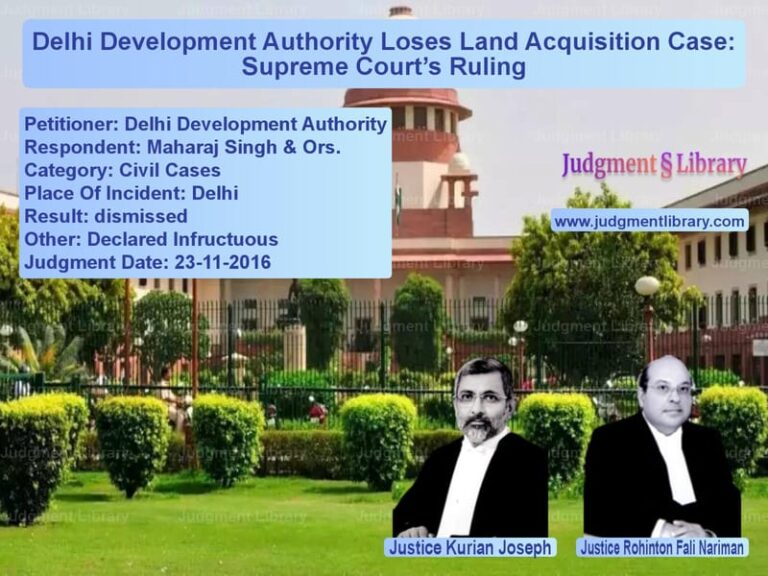Supreme Court Grants Ownership Declaration in Karnataka Land Dispute
The Supreme Court of India, in its judgment dated 25 November 2021, ruled in favor of the appellants, Akkamma & Ors., granting them a declaration of ownership over a disputed land parcel in Vibhuthipura Village, Krishnarajapura Hobli, Bangalore South Taluk. The case revolved around conflicting claims of ownership and possession over a 10.54 guntas land area, with the appellants seeking legal recognition of their title while the respondents contested their claim.
Background of the Case
The legal dispute began in 1987 when the appellants’ predecessor, Arakeri Abbaiah, filed a suit seeking a declaration of ownership and an injunction against the respondents, Vemavathi & Ors., to prevent interference with their possession of the land. The original plaintiff claimed to have acquired the property through a registered sale deed dated 29 May 1972 and alleged that the respondents were making unlawful attempts to encroach upon the land.
This was not the first litigation involving the property. A previous suit had been filed in 1982 by the original plaintiff, seeking an injunction against the respondents. That case was dismissed by the Trial Court on the ground that the plaintiff failed to establish possession, and the dismissal was upheld by the Karnataka High Court in 1986.
Petitioners’ Arguments
The appellants, represented by legal counsel, argued:
- Their predecessor had acquired the land through a valid sale deed and was in uninterrupted possession until the respondents unlawfully attempted to interfere.
- Documents such as the Record of Rights (RoR) extracts from 1987 supported their claim of ownership and possession.
- The Trial Court had dismissed their case without considering key evidence proving their possession.
- The earlier 1982 suit for injunction should not bar them from seeking a declaration of ownership in a separate case.
Respondents’ Arguments
The respondents, Vemavathi & Ors., countered the appellants’ claims, arguing:
- The property was purchased in a benami transaction, with the first respondent being the real owner.
- The appellants failed to prove continuous possession over the land.
- The earlier 1982 suit had already concluded that the appellants were not in possession, and the present case was an attempt to relitigate settled issues.
- The suit was time-barred and should be dismissed.
Supreme Court’s Observations
The Supreme Court bench, comprising L. Nageswara Rao and Aniruddha Bose, carefully reviewed the evidence, previous judgments, and legal principles governing ownership disputes. The Court noted:
- The appellants’ sale deed was valid and uncontested by documentary evidence from the respondents.
- The Record of Rights extracts corroborated the appellants’ claim to ownership and possession.
- The dismissal of the 1982 injunction suit was based on possession and did not preclude the present suit for ownership declaration.
- The claim was not time-barred as the cause of action was based on the respondents’ recent interference attempts.
Key Supreme Court Rulings Cited
The Court referenced several legal precedents, including:
- Ram Saran v. Smt. Ganga Devi (1973) – Affirming that declaratory relief is not barred if possession is not established in a prior suit.
- Vinay Krishna v. Keshav Chandra (1993) – Clarifying that ownership claims can be pursued separately from possession claims.
- Anathula Sudhakar v. P. Buchi Reddy (2008) – Emphasizing that injunction suits and ownership declarations serve distinct legal purposes.
Final Judgment
The Supreme Court ruled in favor of the appellants, modifying the lower court’s judgment and granting them a declaration of ownership. The key directives were:
- The appellants were declared the rightful owners of the disputed land.
- The suit for possession and injunction was dismissed due to failure to establish possession.
- The respondents were restrained from interfering with the appellants’ ownership rights.
- The appeal was partially allowed, affirming the principle that ownership can be recognized even if possession is disputed.
Implications of the Judgment
This landmark ruling has significant implications for land disputes in India:
- Clarity on Ownership vs. Possession: The judgment reinforces the principle that ownership can be separately established even if possession is contested.
- Legal Protection for Landowners: Property buyers with valid sale deeds have judicial recourse to affirm ownership despite previous possession disputes.
- Preventing Unlawful Encroachment: The ruling provides a safeguard against parties attempting to claim land through adverse possession.
- Guidance for Future Litigation: Courts must differentiate between declaratory relief and possession claims when assessing property disputes.
The Supreme Court’s decision in this case upholds the fundamental rights of property owners and ensures that rightful landowners are not denied justice due to procedural technicalities.
Petitioner Name: Akkamma & Ors..Respondent Name: Vemavathi & Ors..Judgment By: Justice L. Nageswara Rao, Justice Aniruddha Bose.Place Of Incident: Bangalore, Karnataka.Judgment Date: 25-11-2021.
Don’t miss out on the full details! Download the complete judgment in PDF format below and gain valuable insights instantly!
Download Judgment: akkamma-&-ors.-vs-vemavathi-&-ors.-supreme-court-of-india-judgment-dated-25-11-2021.pdf
Directly Download Judgment: Directly download this Judgment
See all petitions in Property Disputes
See all petitions in Specific Performance
See all petitions in Judgment by L. Nageswara Rao
See all petitions in Judgment by Aniruddha Bose
See all petitions in partially allowed
See all petitions in Modified
See all petitions in supreme court of India judgments November 2021
See all petitions in 2021 judgments
See all posts in Civil Cases Category
See all allowed petitions in Civil Cases Category
See all Dismissed petitions in Civil Cases Category
See all partially allowed petitions in Civil Cases Category

